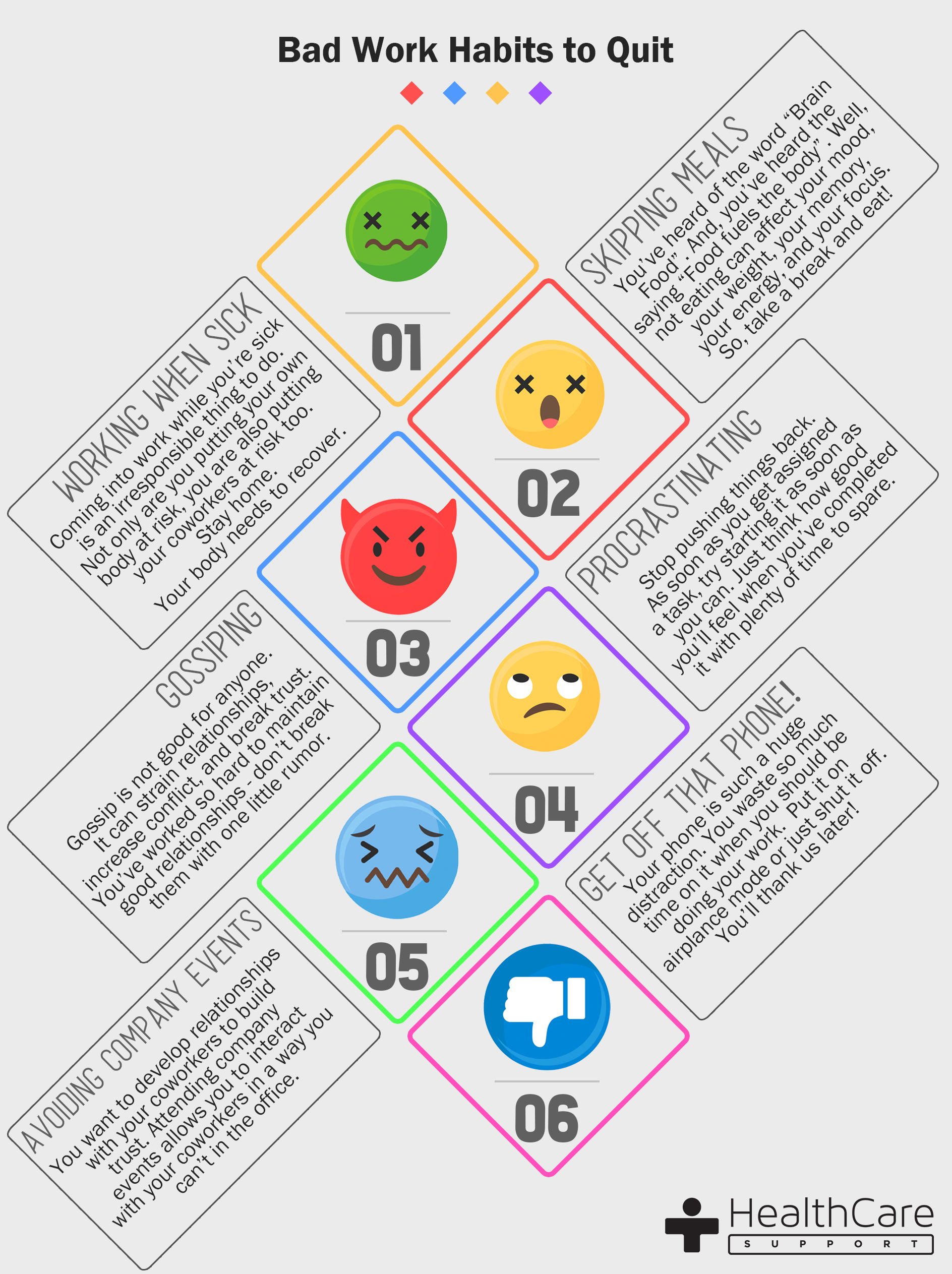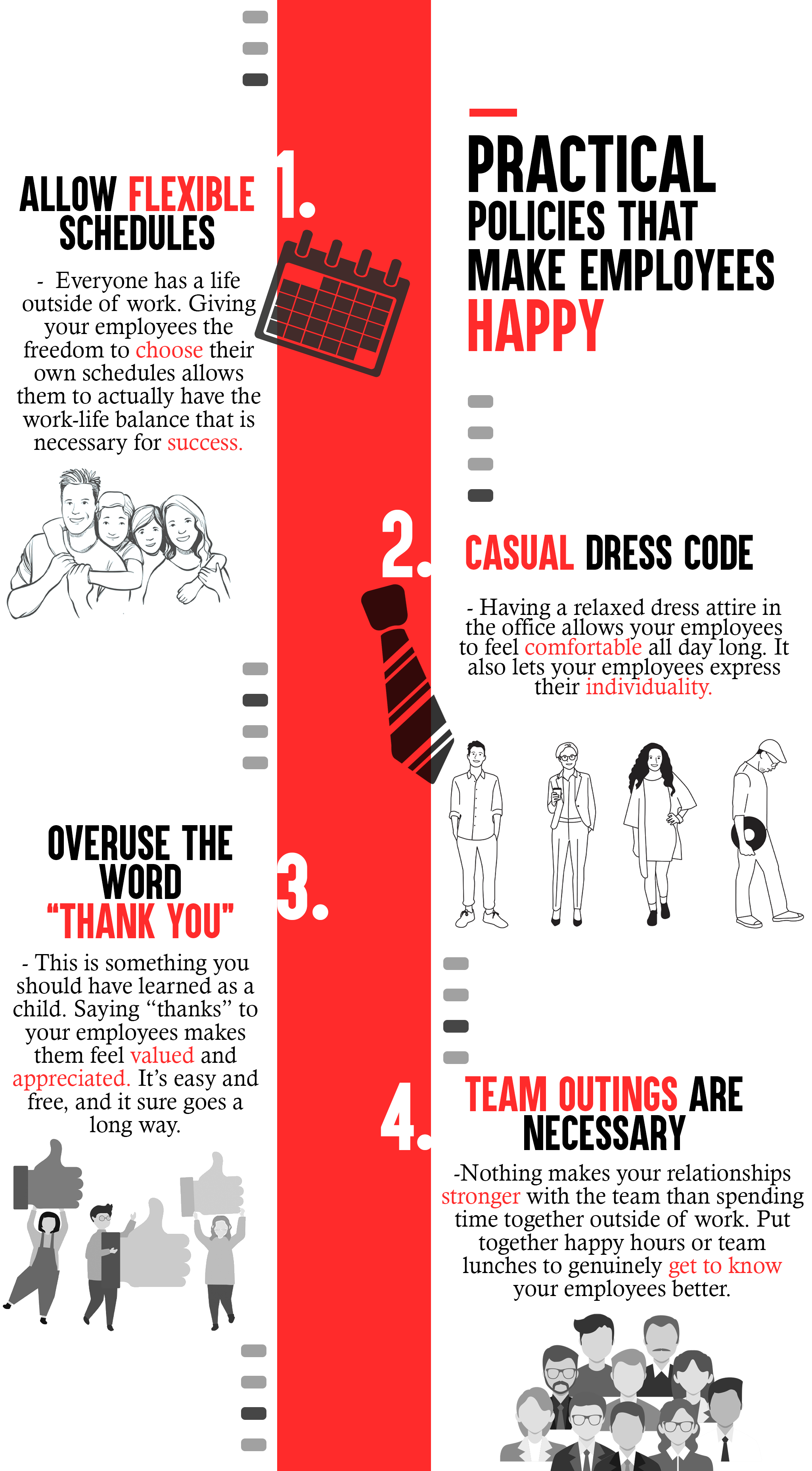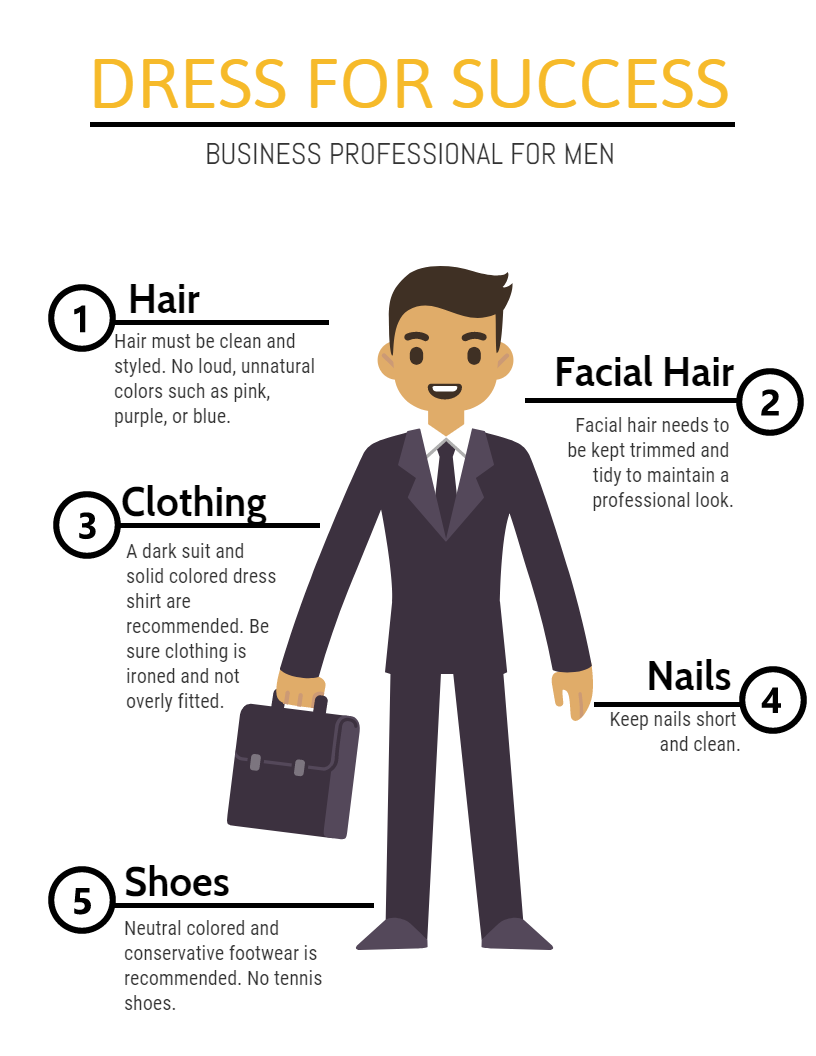
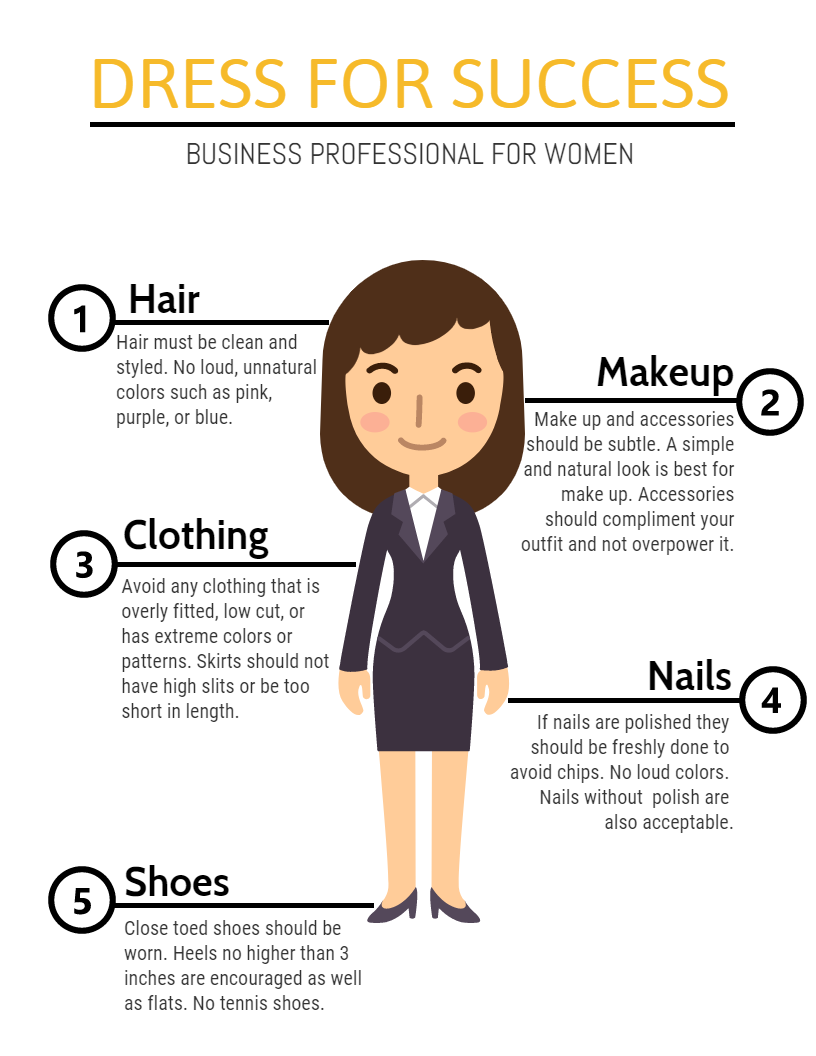
Author Archives: Zach Kohlmeier
Bad Work Habits to Quit Right Now
Practical Policies That Make Employees Happy
Things I Wish I Knew Before Starting My First Job
Whether you’re a new grad or you’ve decided to look for a new position, congratulations on the new adventure you’re starting! Not only can this be a really exciting time for you, but it can also be a bit stressful. Full disclosure: this will be one of the toughest times in your life. Yes, there are tons of positions open all over the world, but you’re also in the same position as four million other people! Don’t get discouraged though! The time will come where you start going on interviews and then, finally, you’ll start your first job!
Starting your very first full-time job can be a little overwhelming. While it’s an exciting time because you finally get to start making your own money to save up for a new car, a house, a wedding, or just to start paying off your student loans, the unknowns can be a little stressful. Here are a couple of things I wish I knew before starting my first position:
Everyone is on their own timeline.
Some people have their dream jobs right out of the gate and others will still be in school getting their Master’s. The worst thing you can do is compare yourself to them. You are not falling behind, and you are not way ahead, you are right on time.
You’re going to make many, many, MANY mistakes.
That’s really the only way you are going to learn. You’re not going to learn anything by being perfect. The worst thing you can do is get angry with yourself. Forget the mistake, remember the lesson and move on.
Make the extra effort to befriend your coworkers.
Starting a new job can be intimidating and so can the people around you. When you start your first workday, try to introduce yourself to as many people as possible. Remember people’s names and make an effort to start a conversation. The friendlier you are, the more comfortable you and your coworkers will be.
There is an opportunity in every single task.
Whether it be a team outing, helping a coworker, or grabbing lunch with your boss, always think about the possible positive outcomes – you could be surprised where it takes you. “Our lives are defined by opportunities, even the ones we miss.” Eric Roth
Decorate your office/cube.
There is no shame in making your office or cubicle feel a little more like home. Grab some picture frames or an inspirational quote and put it on your desk. You’ll spend 40 hours a week in that space, you might as well spice it up with things you like. AND it doesn’t hurt to keep it clean.
Setting attainable goals.
Whether it be work related or personal, it’s important to set goals. Goals are like plans that help us break things down into doable tasks. Too often we celebrate finished products and not all the little tasks we completed that got us there. Allow yourself the gratification of completing all these tasks, you’ll be surprised how accomplished and motivated you feel.
You are not alone if starting a new job stirs feelings of anxiety and fear. Be confident in your skills, remember they hired you and trust the process. For help with resume writing, preparing for your interview, negotiating salaries, and more subscribe to our blog.
4 Things To Do Before Heading To Work
There’s so many things to do to get yourself in the right mindset before you head off to work!
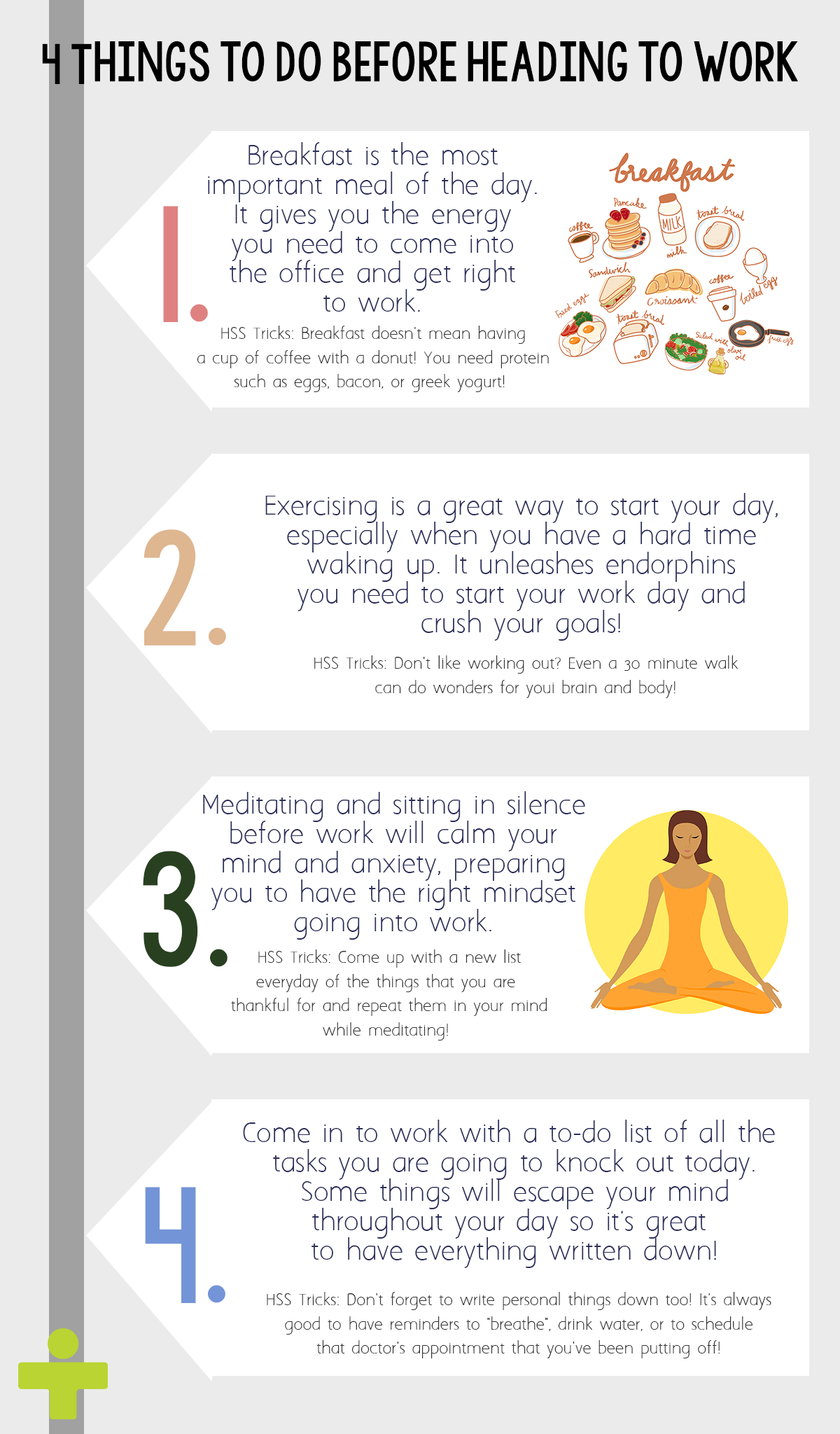
Tips for New Triage Nurses
As a Triage Nurse your challenging duty is to medically assess the patients’ illnesses and symptoms to determine which patients need immediate attention from the doctor. It’s a tricky job considering having to deal with a room full of worried patients and family members, so doing it as a novice can seem pretty much impossible. But, don’t worry, there have been many people in your shoes and we’re going to simplify it by giving you some tips and tricks to ace your job!
First things first, greet every patient with a smile.
They are already scared, so try and ease their anxiety by treating them warmly. If you make your patients feel more comfortable, they will feel better telling you their medical history. If you were to be cold and emotionless, they might feel the need to withhold some important parts of their medical history that could help you in the end.
Take your time and be efficient.
I know there may be tons of people in the waiting room but rushing your patients won’t do you any good. Take it slow with them. Make sure you’re getting all the information needed to be able to follow the correct protocol. It’s easy to jump to conclusions after you hear the first symptom but you need to explore all possibilities.
Trust your instincts.
So many people come into the emergency room with self-diagnoses that they got from the internet. Take into consideration their concerns, but also give a full assessment and make your decisions based on that assessment. Remember that this is your decision and not theirs, you’re the one with the credentials and knowledge.
Don’t be afraid to ask more questions.
Probe a little further into your patient’s history or ask them questions that could narrow down the list of potential medical problems to improve your chances of finding the cause of your patients’ symptoms.
Have open communication with your patients.
Be sure to make them comfortable enough to want to come in if they have any other symptoms or if any of their illnesses worsen. Don’t fall into the trap of once you hand off the patient to the doctor, you are done. Before the patient leaves, make sure he or she knows that if they have any questions or concerns to come to you. Be approachable. Also, make sure you’re communicating with your other patients in the waiting room by keeping them updated on delays or just simply checking in on them.
Triage nurses have a big responsibility as they are the first person a patient sees when they are scared and in a time of need. Figuring out the cause of their illness takes time and careful attention. To apply for one of our Triage Nurse positions, click here.
5 Ways to Take Charge of Your Career
In just about every interview, you can expect to be asked, “Where do you see yourself in 5 or 10 years?” A generation ago, we used to know… You get a job in your twenties, work hard to get raise after raise, get promoted once or twice, and then you retire. Nowadays, people don’t know. They get bored with one company and then jump to the next one, looking for something that’s new and challenging, sometimes even returning to school for a complete career change. An unclear path like this makes it hard to create a career vision and figure out where you actually see yourself in 10 years. Hiring managers understand this jump-ship mentality and it’s why almost every hiring manager asks you this question.
Let’s dive in and help you take control of your own future.
-
Develop yourself.
In order for you to grow in your career, you also need to grow your skillset. Try to learn something new every day. Find people who have similar roles to you and take a look at their skills. What are they doing that you can’t?
-
Networking is a must.
Take the time to build relationships with people in the business world. This could open many doors for you down the road. It’s also nice to have a lot of people in your corner rooting for you to succeed. The more connections you have, the more possibilities there are. Use them to your advantage.
-
When you want something, you’ve got to ask for it.
For example, if there’s an opening in upper management and you want the position, what do you do? Go to your supervisor and tell them why you should be considered for the role. Don’t tell them why you should have the role. Explain why you should be considered, use statistics, explain your experience, and share your accolades. Don’t risk being looked over for the position because you didn’t say something.
-
Stay passionate.
Write a list of all the things you love about your position to keep you motivated. Then, write a list of things you’d like to be doing down the road – skill wise. Chances are you could find that in with your current company. Maybe you’d like to lead a team- create a target and work towards it.
-
Ride outside your comfort zone.
Consider your comfort zone a small circle around you using the skills and connections you’ve had for years. Now think of all the skills and connections outside of that small circle that you are missing out on. Live life to the fullest and try to be a “yes man”. You never know what could come out of going outside your comfort zone.
Figure out where you want to be, what direction you want to go in, and what you want to be doing (what’s your 10-year plan). Only you can control your future.
Using a Temporary Assignment to Land a Permanent Position
Temporary employment has seen tremendous increase over the past few years, especially in healthcare. Many industries, including retail and healthcare, experience increased personnel needs several times a year, be it for a special assignment, auditing or due to a seasonal increase in business.
Although it’s common to first see the cons in a temporary position, there are some very strong positives to keep in consideration. Temporary employment allows you to get a feel for or “test drive” a company and/or position. This type of employment can also offer the opportunity to pick up new skills that were not available to you in your past position. Another perk to a temporary job comes in the connections you will make. Getting the opportunity to work a temporary job alongside a professional you admire or for a highly sought-after firm will allow you to expand your contacts and build professional and personal connections that could provide solid references or suggest you for a future permanent opening.
Now that you know the vantage point of temporary employment, let’s look into ways you can use a temporary assignment to land a permanent position:

-
The first’s ones obvious: Be good at what you do.
Be a successful temporary employee and show them why they need to hire you permanently. Treat your temporary position as a permanent one because managers look for quality workers that are committed, hardworking, and passionate about what they do.
Carpe diem! Seize every opportunity you get to better yourself – whether that be staying extra after work helping someone with their patient or arriving a few minutes early to help the administrators. Make it your mission to come in everyday and learn something new, whether that be in your job description or outside it. There is never such thing as too much growth and knowledge.

-
Being a team player can help you turn a temp position into a permanent one.
Teamwork skills are very important skills to build and maintain. Not only does it improve your relationship with your coworkers, but it also shows everyone that you have what it takes to work alongside them permanently. Your coworkers just might become your promoters when a permanent position becomes available.

-
Let your employer and recruiting firm know that you’d like to be hired permanently.
This is probably the easiest thing to do, but is often overlooked. It’s important your manager and recruiter know you are serious about this position and want to be hired full time. Show them you are dedicated and motivated to fully be a part of the company. It doesn’t hurt to show them how you’ve impacted the company during your assignment either!
The Marie Kondo Effect – Spring Cleaning Edition
The Marie Kondo Effect – Spring Cleaning Edition
Spring is here! Have you started your spring cleaning? If not, watch “Tidying Up with Marie Kondo” on Netflix to get in the spirit. In the meantime, we’ve summarized some tips and tricks for getting organized and clean this spring.
I know two things in life. 1. Cleaning is one of the least exciting things ever. 2. Getting rid of things you might actually need down the road is a tough thing to do — what if you end up needing that $3 butterfly net you got at Goodwill 2 years ago? Chances are you probably won’t ever use it ever again but there’s always that “what if”.
“Tidying Up with Marie Kondo” helps us with that. The show is basically about a woman that goes around to people’s houses and helps them purge by dumping all their things on their beds and seeing which items still “spark joy”. If they don’t, to Goodwill they go. This not only works for your living space, but also for your car, your computer files, and of course, your work office!
So, why is spring cleaning beneficial?
Being busy in the 8-5 business world, I’m sure organizing your desk is one of the last things on your mind, but it can be really important for your success. Here are a couple reasons why you should spring clean your desk/office right this second:
-
It makes you more efficient.
When you have a place or file for everything you wont waste your time looking through piles of papers on your desk. Everything is right where it should be, and this keeps you at the top of your game.
-
Being unorganized is distracting.
If there are a lot of things on your desk, it’s easy to get distracted by old papers or old projects. There is also the factor that looking at your messy desk, and thinking about how you have a messy desk, is also distracting and wasting time. Having an unorganized desk makes for an unorganized mind.
-
It makes you appear more professional
. Someone who is a very professional person takes pride in appearing clean and organized, whether that be their outfit, makeup, hair, or even their desk. Look at your desk from a different perspective. What does the way it looks say about you?
-
Keeps important or sensitive information protected
. Being unorganized could leave you at risk for accidentally exposing delicate information that can easily be misplaced on a messy desktop. Keep all your sensitive information stored in a locked drawer.
-
More room to do your work
. It’s hard to do your work when every time you reach for a sip of water, you knock something off your desk. Having a clean workspace, gives you the space you need to be diligent.
-
Keeps you from getting sick!
Besides productivity reasons, having a tidy desk also allows you to clean your desktop. Did you know the average desk contains 400 more germs than a toilet seat? Get in the groove of cleaning it every Friday, and you’ll surely cut back the amount of office colds you’re exposed to.
What better time than spring to do a little cleaning? Set some time aside to go through your drawers, your computer files, and your desktop to see which items “spark joy” in you. If they don’t, it’s time to say goodbye.
Get a Hobby – It’s Good for Your Career!
A “work-life balance” seems to be what everyone is chasing after. You work hard all day so when you come home, you’re able to unwind by doing something you actually love to do. Your overall well-being is very important to your long-term success and your hobbies contribute immensely to that. Hobbies positively impact your personal life (for obvious reasons) and it also positively impacts your professional life as well. Here’s why:
- There are some hobbies that build confidence. Being confident is a very important quality to have, especially in the workplace. It allows you to express your ideas or opinions in a poise manner. Confidence is the key to success, and it shapes the foundation of your endurance. Some hobbies that can boost your self-esteem and confidence are running marathons, yoga, traveling alone, and learning a new language or instrument.
- Having hobbies make you seem like a more interesting person. It can help other people get a sense of what you’re all about and helps you connect with other people. People want to be around other people that have attractive lifestyles, otherwise there’s not much to talk about! Want to be a more interesting person? Try rock climbing, fishing, volunteering, or photography.
- If you have the type of job where you are working your left brain all day, then maybe you need a hobby that works the right side. Having a creative hobby stimulates your brain and affects your brainstorming and problem-solving abilities. You’re able to think more outside the box and it sets you apart from other peers or companies. Start painting, writing, knitting, baking, or doing DIY projects.
- Hobbies can improve your multitasking. Having a multitasking hobby can help speed up your performance, especially if you are working on a couple different things at one time. It can also help train your brain to stay focused for a long period of time. A couple great multitasking hobbies are cooking, dancing, and acting.
- A great way to network is through having hobbies! By going to spinning classes, golfing, or playing team sports, you meet so many people and get a chance to widen your professional circle. Who knows, maybe your spin class neighbor is the CEO of your dream company!
Overall, everyone needs hobbies to stay sane. Get out there and find a couple things you like! There are millions of hobbies and, one way or another, they’ll affect your life in some way!





